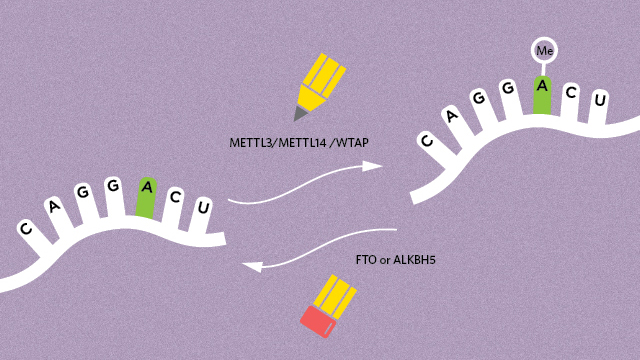At least 140 alternative RNA nucleotide forms exist. On mRNA, the most common is the methylation of adenosine on the N6 position (m6A). This epigenetic mark is laid down by a “writer” protein complex that includes three well-characterized components: METTL3, METTL14, and WTAP. The reverse process of RNA demethylation is performed by “erasers,” such as the enzymes FTO and ALKBH5.
 THE SCIENTIST STAFFRNA molecules marked with epigenetic modifications can then affect cellular processes through the function of specific “reader” proteins that bind the modified nucleotide. Known readers of m6A include YTHDF1, which stimulates protein synthesis by interacting with the translation machinery and increasing translation efficiency; human YTH domain family 2 (YTHDF2), which mediates mRNA degradation; and the RNA-binding protein heterogeneous nuclear ribonucleoprotein A2B1 (HNRNPA2B1), which mediates alternative splicing.
THE SCIENTIST STAFFRNA molecules marked with epigenetic modifications can then affect cellular processes through the function of specific “reader” proteins that bind the modified nucleotide. Known readers of m6A include YTHDF1, which stimulates protein synthesis by interacting with the translation machinery and increasing translation efficiency; human YTH domain family 2 (YTHDF2), which mediates mRNA degradation; and the RNA-binding protein heterogeneous nuclear ribonucleoprotein A2B1 (HNRNPA2B1), which mediates alternative splicing.
 THE SCIENTIST STAFF
THE SCIENTIST STAFF
Read the full story.

















